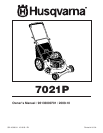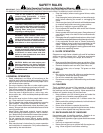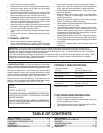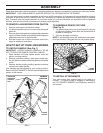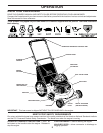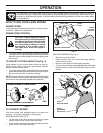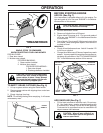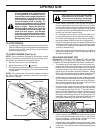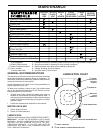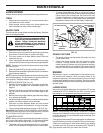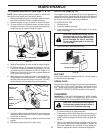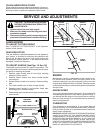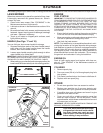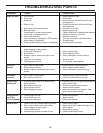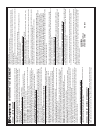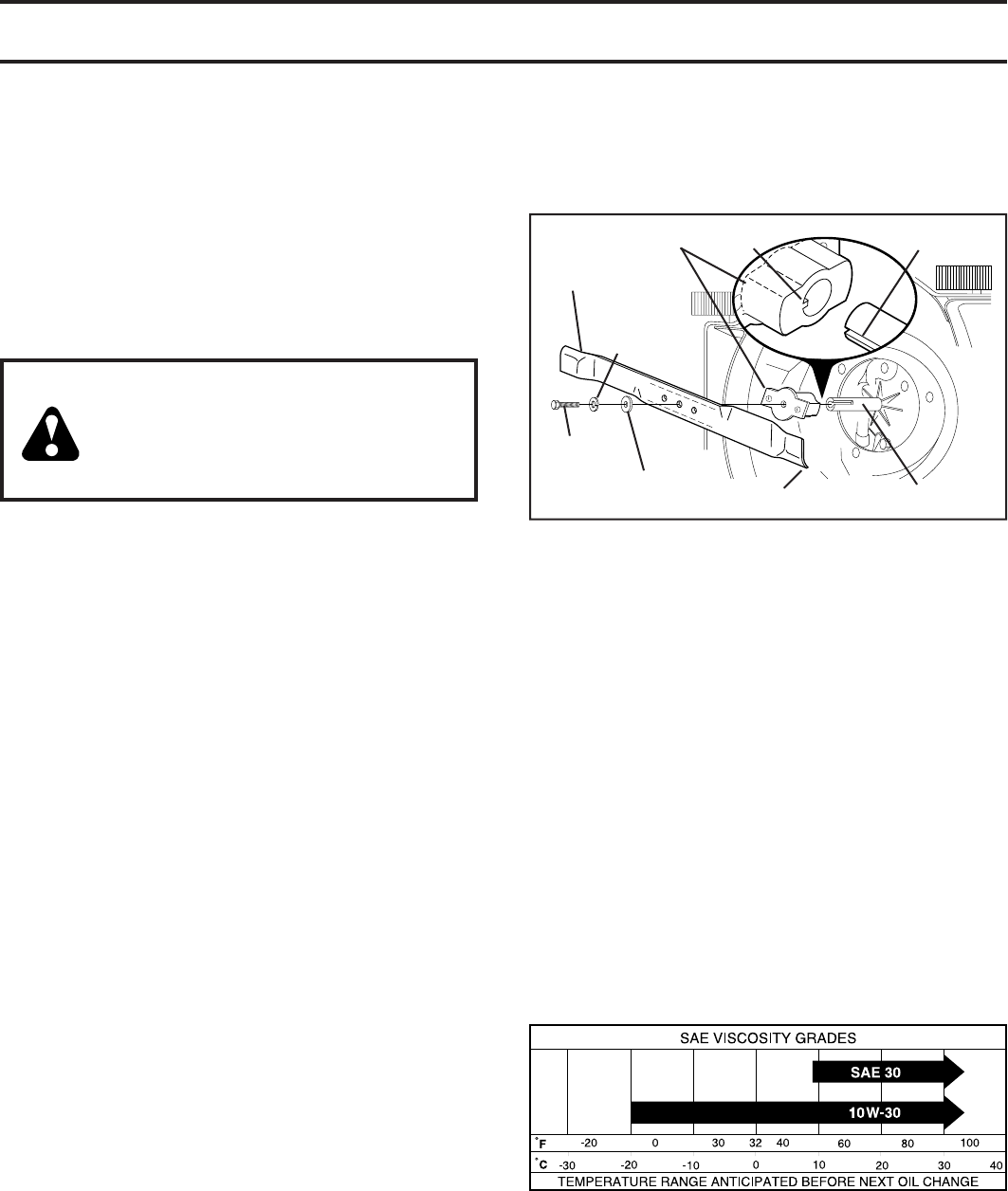
10
LAWN MOWER
Always observe safety rules when performing main te nance.
TIRES
• Keep tires free of gasoline, oil, or insect control chem-
i cals which can harm rubber.
• Avoid stumps, stones, deep ruts, sharp objects and
other hazards that may cause tire damage.
BLADE CARE
For best results, mower blade must be kept sharp. Re place
bent or dam aged blades.
CAUTION: Use only a replacement blade
approved by the manufacturer of your
mower. Using a blade not approved
by the manufacturer of your mower is
hazardous, could damage your mower
and void your warranty.
TO REMOVE BLADE (See Fig. 10)
1. Disconnect spark plug wire from spark plug and place
wire where it cannot come in contact with plug.
2. Turn lawn mower on its side. Make sure air fi lter and
carburetor are up.
3. Use a wood block between blade and mower hous ing
to prevent blade from turning when re mov ing blade bolt.
NOTE: Protect your hands with gloves and/or wrap blade
with heavy cloth.
4. Remove blade bolt by turning counter-clockwise.
5. Remove blade and attaching hardware (bolt, lock wash er
and hardened wash er).
NOTE: Remove the blade adapter and check the key inside
hub of blade adapter. The key must be in good condition to
work properly. Replace adapter if dam aged.
TO REPLACE BLADE (See Fig. 10)
1. Position the blade adapter on the engine crank shaft.
Be sure key in adapter and crankshaft key way are
aligned.
2. Position the blade on the blade adapter aligning the
two (2) holes in the blade with the raised lugs on the
adapter.
3. Be sure the trailing edge of blade (opposite sharp edge)
is up toward the engine.
4. Install the blade bolt with the lock washer and hard ened
washer into blade adapter and crank shaft.
5. Use block of wood between blade and lawn mower
housing and tighten the blade bolt, turning clock wise.
• The recommended tightening torque is 35-40 ft. lbs.
IMPORTANT: BLADE BOLT IS HEAT TREATED. IF BOLT NEEDS
REPLACING, REPLACE ONLY WITH APPROVED BOLT SHOWN
IN THE REPAIR PARTS SECTION OF THIS MANUAL.
TO SHARPEN BLADE
NOTE: We do not recommend sharp en ing blade - but if you
do, be sure the blade is balanced. An un bal anced blade
will cause eventual damage to lawn mower or engine.
• The blade can be sharp ened with a fi le or on a grinding
wheel. Do not attempt to sharpen while on the mower.
MAINTENANCE
FIG. 10
BLADE
BOLT
HARDENED
WASHER
LOCK
WASHER
BLADE ADAPTER
KEY
BLADE
TRAILING EDGE
CRANKSHAFT
KEY WAY
CRANKSHAFT
• To check blade balance, drive a nail into a beam or
wall. Leave about one inch of the straight nail ex posed.
Place center hole of blade over the head of the nail.
If blade is balanced, it should remain in a horizontal
position. If either end of the blade moves downward,
sharpen the heavy end until the blade is balanced.
NOTE: Multi-viscosity oils (5W30, 10W30 etc.) improve
starting in cold weather, and you should check your engine
oil level frequently to avoid possible engine damage from
running low on oil.
Change the oil after every 25 hours of operation or at least once
a year if the lawn mower is not used for 25 hours in one year.
Check the crankcase oil level before starting the engine
and after each fi ve (5) hours of continuous use. Tighten oil
plug securely each time you check the oil level.
GRASS CATCHER
• The grass catcher may be hosed with water, but must
be dry when used.
• Check your grass catcher often for damage or de te -
ri o ra tion. Through normal use it will wear. If catcher
needs replacing, replace only with ap proved replace-
ment catcher shown in the Repair Parts section of this
manual. Give the mower model number when ordering.
ENGINE
Maintenance, re pair, or re place ment of the emission con-
trol de vic es and sys tems, which are be ing done at the
cus tom ers expense, may be performed by any non-road
engine repair es tab lish ment or individual. Warranty repairs
must be performed by an authorized engine man u fac tur er's
service outlet.
LUBRICATION
Use only high quality detergent oil rated with API service
classifi cation SF-SJ. Select the oil's SAE viscosity grade
according to your expected operating temperature.



